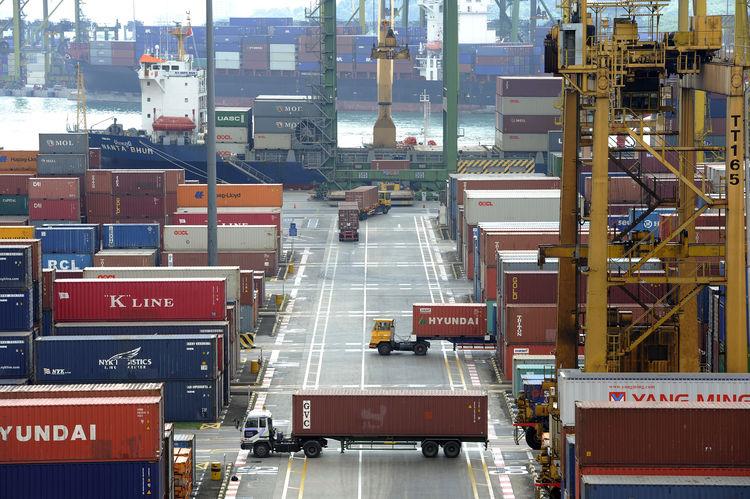Recent data released by the National Bureau of Statistics (NBS) paints a bleak picture for Nigeria’s exports to India, showing a dramatic 61% decline over the past year.
This sobering revelation comes as President Bola Ahmed Tinubu leads a high-level corporate delegation from Nigeria to India for a business conference held on the sidelines of the G20 summit hosted by the country. The primary goal of the conference is to entice foreign direct investment into Nigeria, a critical need for the nation’s economic development.
In a noteworthy shift, India, once Nigeria’s top export destination in the first half of 2022, has now slipped out of the top 5. Spain assumed the lead in the third quarter of 2022.
Exports to India Witness a Sharp Decline
According to NBS data, Nigeria’s trade exports to India during the second quarter of 2023 totaled N463.3 billion, ranking India as Nigeria’s sixth-largest export destination. This represents a significant decrease from the same period in 2022 when Nigeria’s trade exports to India were N1 trillion, making India Nigeria’s largest export market at that time.
The downturn in exports to India has been a persistent trend since the third quarter of 2022 when total exports dipped to N619.2 billion. By the close of 2022, exports had dwindled further to N490.4 billion.
The total exports to India have plummeted by 61%, from N2.1 trillion in the first half of 2022 to N849 billion in the first half of 2023.
Concurrently, the overall trade with India, including imports, has fallen by 44.6%, from N3 trillion in the first half of 2022 to just N1.69 trillion in the first half of this year.
Nigeria is presently operating with a thin trade surplus of just over N5 billion with India in the first half of 2023, a stark contrast from approximately N1.2 trillion during the same period in 2022.
Reasons Behind the Decline
The principal driver of this steep decline is the plummeting exports of crude oil, which once accounted for a significant portion of Nigeria’s trade with India. At its peak, crude oil exports constituted as much as a trillion naira in trade between the two countries.
For example, in the first and second quarters of 2022, crude oil exports to India stood at approximately N1.03 trillion and N1.09 trillion, respectively.
However, the trend reversed in the latter half of 2022, with exports dropping to N559.3 billion in Q3 and N420.8 billion in Q4.
This downward trajectory persisted into 2023, with crude oil exports dwindling to just N327.8 billion and N368.2 billion in the first and second quarters, respectively.
This overall decline in crude oil exports to India has also impacted Nigeria’s total crude oil exports, which registered at N10.6 trillion in the first half of 2023, compared to N11.5 trillion during the same period in 2022.
Nigeria’s Loss, Russia’s Gain
It appears that Nigeria has lost a substantial portion of its export market share in India to Russia, primarily due to the ongoing Russian-Ukraine conflict. The war has made Russian crude oil more cost-effective, likely prompting India to reduce its reliance on Nigeria’s crude oil exports.
According to a New York Times report citing the International Energy Agency, India purchases “nearly two million barrels a day, roughly 45 percent of its imports.”
Nigeria is also facing competition from Iraq and other Middle Eastern countries, all of which export crude oil to India.
India, the world’s third-largest oil consumer and importer, imports approximately 84% of its crude oil requirements. Also, India is the fourth-largest importer of liquefied natural gas (LNG), which accounts for roughly one-fourth of its total gas demand. The country’s growing demand for both oil and natural gas presents significant opportunities for exporters.
President Tinubu’s visit to India has primarily focused on attracting foreign direct investments into Nigeria.
Nevertheless, the urgent need remains to rekindle India’s interest in importing Nigeria’s crucial crude oil, which plays a vital role in stabilizing Nigeria’s foreign exchange inflows.

 Forex4 weeks ago
Forex4 weeks ago
 Naira4 weeks ago
Naira4 weeks ago
 Billionaire Watch3 weeks ago
Billionaire Watch3 weeks ago



 Naira4 weeks ago
Naira4 weeks ago






 Naira3 weeks ago
Naira3 weeks ago


 Naira2 weeks ago
Naira2 weeks ago






 Naira2 weeks ago
Naira2 weeks ago


 Naira2 weeks ago
Naira2 weeks ago


















